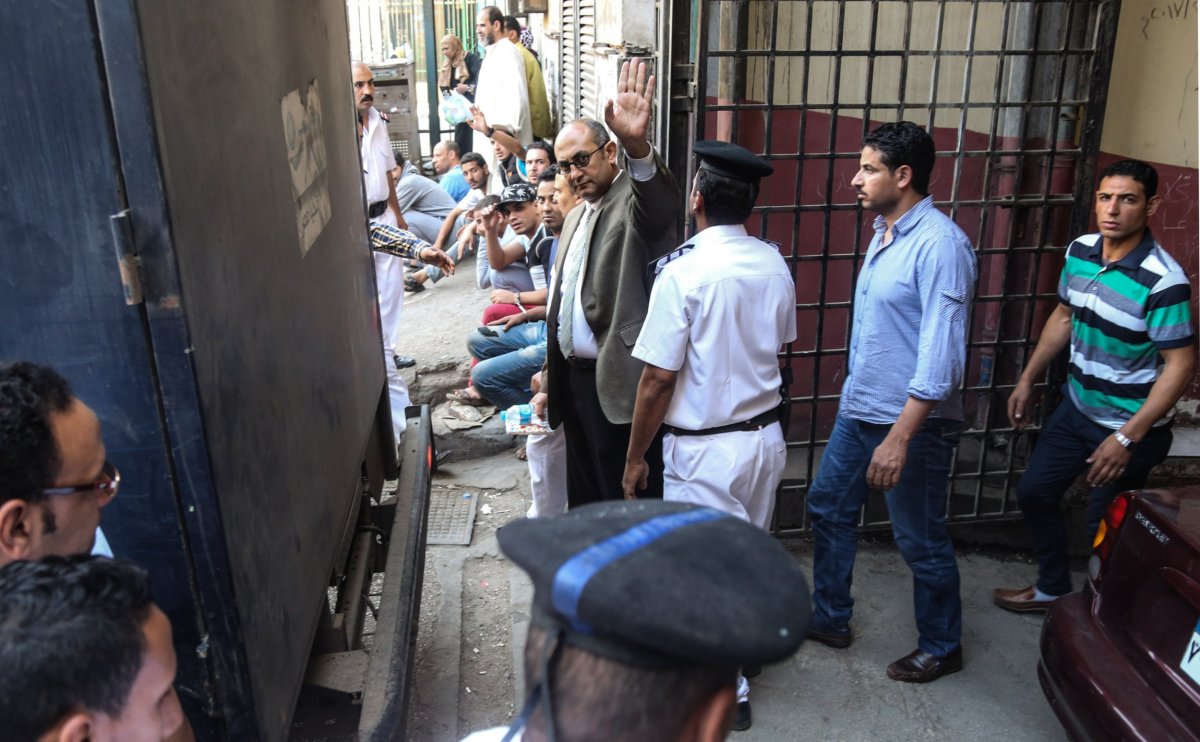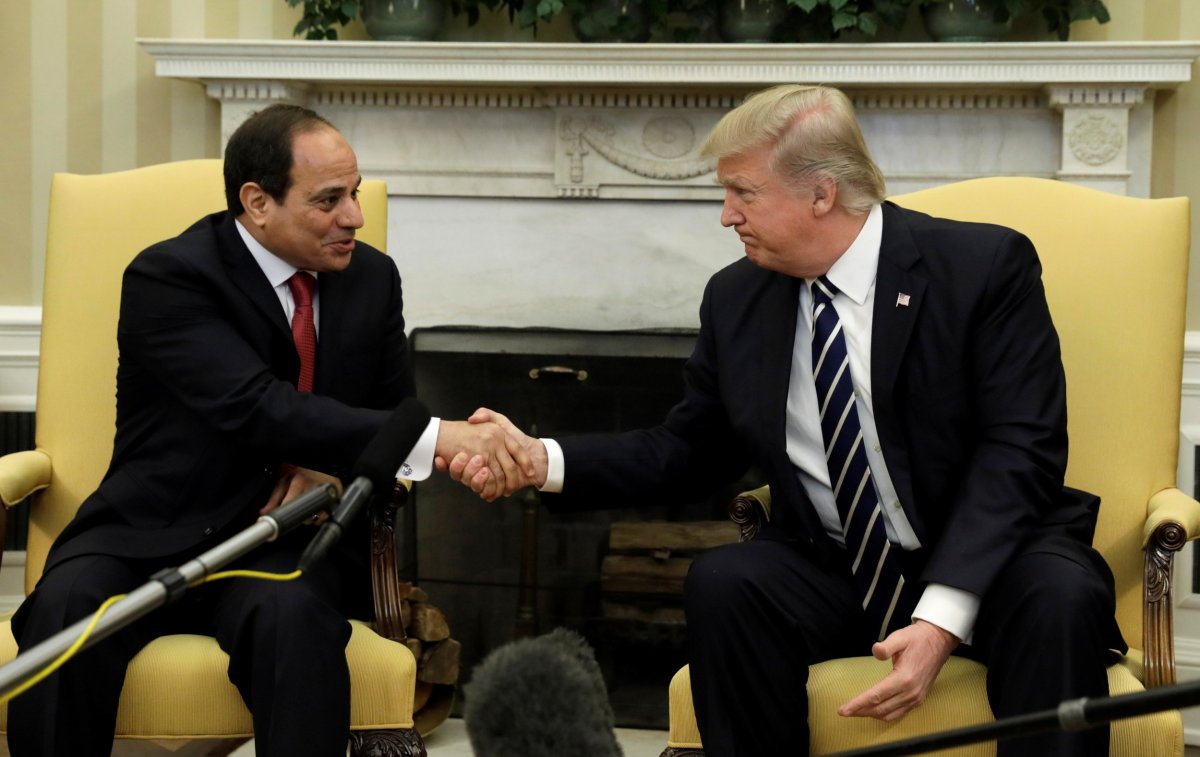If Khaled Ali is worried, he isn't showing it. Sitting behind a wooden desk in his office in downtown Cairo, the prominent human rights attorney is discussing his case with the calm remove of a lawyer defending his client. Only this time, Ali is the one on trial.
In May, Egyptian authorities arrested Ali, a possible presidential candidate in the Egyptian elections early next year, on charges of "offending public decency" for making a rude hand gesture outside a Cairo courthouse. Ali made the gesture in January, in celebration of a ruling by one of Egypt's highest courts in a lawsuit he had filed against the government of Egyptian President Abdel-Fattah el-Sissi for transferring control of two Red Sea islands to Saudi Arabia. The agreement, which many Egyptians believe el-Sissi made in exchange for billions of dollars in Saudi aid and investment, sparked rare street protests last year, despite heavy legal restrictions on demonstrations. Though Ali prevailed that day, he ultimately lost the suit. El-Sissi bypassed the courts and sought approval from Parliament, which ratified the deal on June 14.
Related: Why Donald Trump and Abdel-Fattah el-Sissi's bromance might not last in Egypt
Ali claims he was arrested in retaliation for his challenges to the regime, including the lawsuit, and his announcement in February that he was considering a presidential run. The charge against him, which Amnesty International has called "absurd," has come to symbolize el-Sissi's many efforts to stamp out any possible rivals. "There is no justified reason for my arrest," Ali tells Newsweek. "It was an attempt to scare me."

Ali has not been scared into compliance. If the verdict in his trial doesn't prevent it, he still might run in next year's election. But his arrest—since April, one of about 50 across Egypt involving activists from at least five opposition parties and political youth groups, including the left-wing Bread and Freedom Party Ali founded—shows how determined el-Sissi appears to be to make sure that there are no viable challenges to his authority. Activists have been charged for offenses as small as expressing dissent online, like Mohamed Walid, a Bread and Freedom Party member from Suez, who was arrested for posting the message "Down with the military rule" on Facebook.
Ali learned of his own arrest order from colleagues in May, when a notice from a public prosecutor arrived in his Cairo office while he was on a weekend trip to Rome for a human rights workshop. On orders from the prosecutor, he flew back to Egypt to present himself for questioning. He was released after an overnight detention, and now faces trial in early July. If convicted, Ali says he could face anything from a fine to time in prison. Ali tells Newsweek he is certain he will be found guilty; if he is, he may be legally barred from becoming a presidential candidate. (Newsweek requested further explanation for the arrests of Ali and other activists from the country's Ministry of Interior but received no response.)
The arrests have intimidated many. Other opposition parties say they are not sure if they will put forward a candidate in next year's election because they fear retaliation, and they do not believe it will be a fair process. "El-Sissi is preventing the opposition from running a solid candidate in the elections against him," says Khaled Dawoud, president of the Dostour Party whose members have been arrested on charges that include insulting the president. Fear of arrests is making young people hesitant to join the party, he says. It is also hurting funding, he notes. "Do you think any businessman will come and give me money if he sees many of my party members getting arrested all the time?"
Meanwhile, el-Sissi's government has intensified its crackdown on other kinds of dissenting voices. At the end of April—in a move experts say was designed to prevent the promotion of two dissenting judges—el-Sissi ratified reforms that gave him new power to appoint the most senior members of the judiciary. Then, starting in May, Egyptian authorities began blocking access to at least 100 websites, including news sites like Al-Jazeera and Egypt's pre-eminent independent news source, Mada Masr. That same month, el-Sissi signed a new law that Human Rights Watch says "will criminalize the work of many [nongovernmental organizations], making it impossible for them to function independently."
El-Sissi had already crippled dissent in Egypt after leading the military ouster of Egypt's first democratically elected president, Mohammed Morsi, in 2013. Since he assumed power the following year, he has taken some 40,000 political prisoners, effectively banned anti-government protests, slapped travel bans on activists and ousted judges deemed insufficiently compliant.
With so few left to challenge him, some here are wondering why el-Sissi seems so intent on crushing his weakened opposition. Some analysts say it is because the president has been made increasingly paranoid by public criticism over his handling of the economy and his security strategy—the Islamic State militant group (ISIS) has launched four attacks since December against Egypt's Christians. Others believe he was eager to quiet opposition ahead of the controversial parliamentary vote over the Red Sea islands deal, which is widely unpopular in Egypt.

Despite these problems, el-Sissi still has significant support within the key state institutions, and neither he nor other members of the Egyptian establishment see his position as vulnerable, says H.A. Hellyer, a senior nonresident fellow at the Atlantic Council, an international affairs think tank in Washington, D.C. At the same time, el-Sissi's seemingly close bond with President Donald Trump has emboldened him further. In May, at a meeting with several Arab world leaders in Riyadh, Saudi Arabia, Trump promised to visit Cairo—and then he complimented el-Sissi on his black dress shoes, saying he loved them. "The change in the White House has sent a further signal that international pressure will not be all that strong," says Hellyer, though he adds that there wasn't much to deter el-Sissi before Trump came into office. "Frankly, the Obama administration wasn't that vigorous in actual policies that were designed to promote good governance in Egypt."
The current circumstances have not made Ali particularly hopeful for his future, but he has pledged to keep fighting. After all, he says, "the regime and authorities can't win every battle." So far, however, it seems the regime has won a lot of them.
Uncommon Knowledge
Newsweek is committed to challenging conventional wisdom and finding connections in the search for common ground.
Newsweek is committed to challenging conventional wisdom and finding connections in the search for common ground.
About the writer
To read how Newsweek uses AI as a newsroom tool, Click here.








